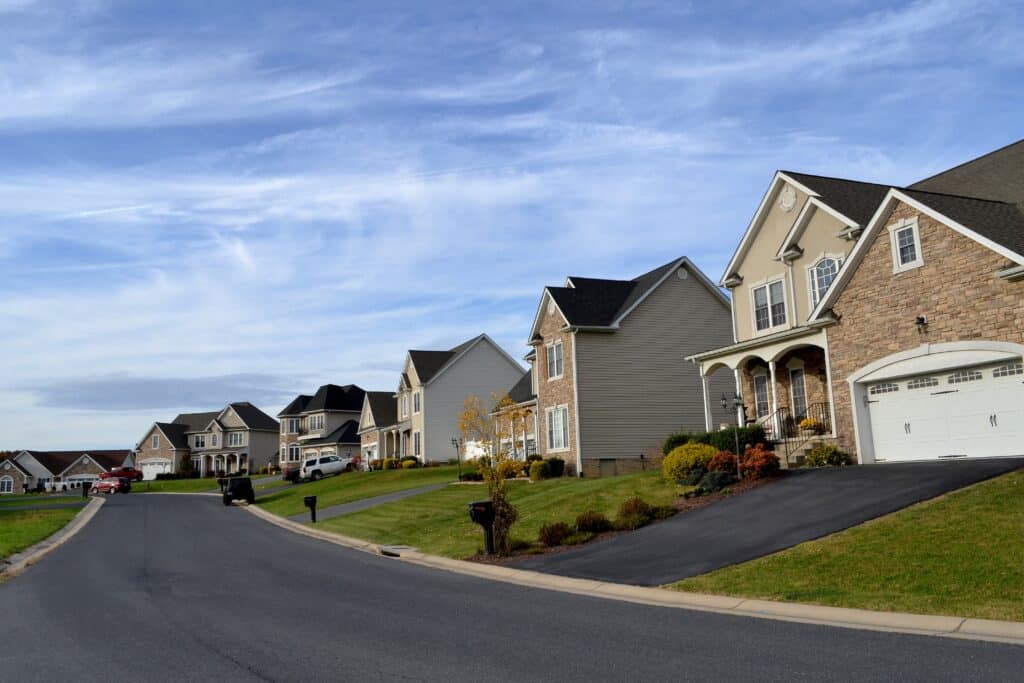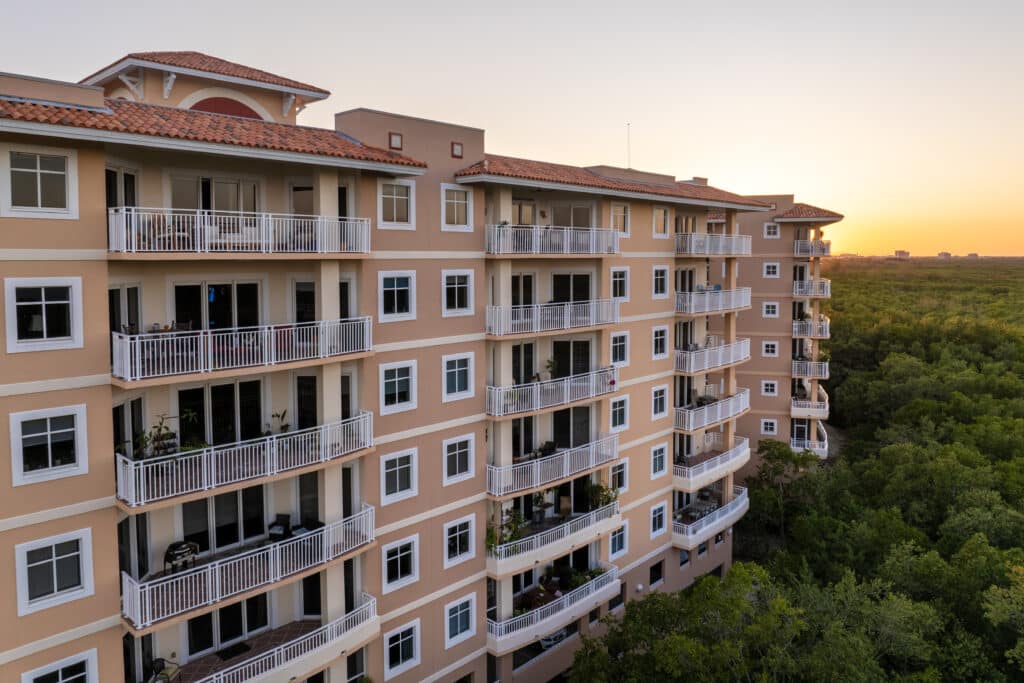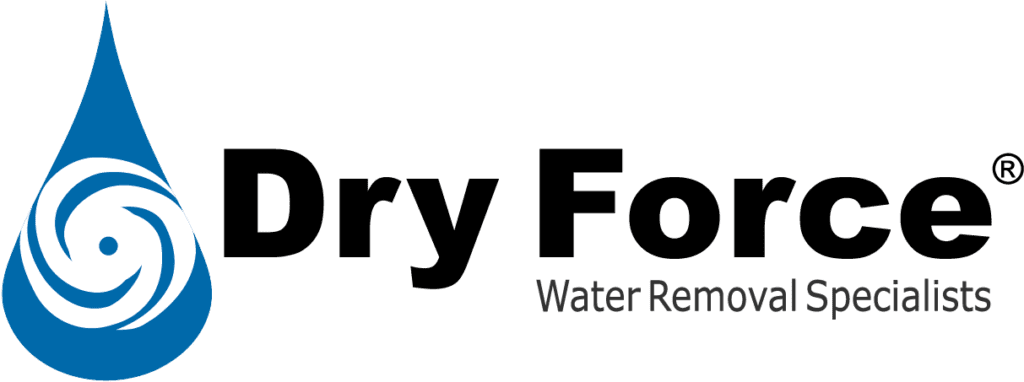
Water damage is highly dangerous, and its side effects can be expensive for homeowners and renters. When members of a group-managed Homeowners Association (HOA) suffer water damage on their property, many have the same question: “Is my HOA responsible for water damage?”
Dry Force is your local expert for all things related to water damage. In the following blog, we will discuss the HOA’s water damage responsibilities, water damage’s side effects, and how a professional restoration company like Dry Force can help you recover from a flood or leak.
Table of Contents
When is the HOA Responsible for Water Damage?
Common Areas vs Individual Units
If you own a townhome or condominium, it is important to understand the HOA’s responsibilities inside and outside your living space. In most communities, the HOA is responsible for water damage in common areas and hallways. They also address water damage to roofs and foundations.
On the other hand, you are typically responsible for water damage inside your individual unit. Water damage originating from negligence will always be the homeowner’s responsibility.
Condo Governing Documents
Every HOA has different rules and regulations. Your governing documents can define your HOA’s responsibility for a water leak and designate which parts of the building fall under HOA or homeowner responsibilities.

When is the Homeowner Responsible for Water Damage?
HOAs are responsible for water damage in common areas, but homeowners are often responsible for in-unit water damage. Homeowners must regularly inspect their units for signs of water damage, such as water stains, musty odors, and dripping noises.
Failing to report water damage to the HOA can result in higher repair costs and liability. Be sure to stay updated on your property’s governing documents to avoid unnecessary payments and legal issues.
Homeowners may be responsible for the following types of water damage:
- Plumbing fixture leaks
- Appliance water leaks
- Burst pipe water damage
- Water damage from negligence
Key Factors That Determine Responsibility of Water Damage
1. Location of damage
Water damage inside your unit is typically your responsibility. Water damage elsewhere often falls on the HOA.
2. Source of water damage
If water damage occurred because of your actions or negligence, responsibility lies with you. As for physical sources, water damage from roof leaks and foundation damage is typically the HOA’s responsibility.
3. HOA insurance and governing documents
Inspect your HOA’s insurance policy and governing documents for specific details on the community’s water damage rules.
What Type of Insurance Covers Water Damage in HOA Communities?
Master Policy
An HOA master policy applies to common areas like lobbies, hallways, and other shared spaces. If water damage occurs in a shared space and its source is covered by the insurance policy, your HOA is responsible for arranging repairs and restoration. The HOA’s insurer can cover associated costs.
HOA insurance policies sometimes include a deductible, meaning the HOA needs to pay out-of-pocket before coverage kicks in. In some cases, the HOA will spread these costs among homeowners.
Homeowners Insurance
If water damage occurs in your unit, you are likely responsible for arranging restoration and filing an insurance claim. Homeowners’ insurance covers most instances of water damage, reimbursing you for lost personal belongings, valuables, and damaged interior structures.
Steps to Determine Liability for Water Damage in an HOA
1. Determine the source of water damage
Common sources include burst pipes, clogged drains, appliance leaks, and storms.
2. Find the water damage location
Is the water damage located in a common area or your unit? The HOA should handle water damage in common areas. Clubhouses and pools also fall under the common area umbrella.
3. Review your HOA’s governing documents
The HOA governing documents should outline water damage liability and create boundaries between private residences and common areas. Be sure to review clauses related to water damage.
4. Inspect your insurance policy
Depending on the location of the damage, you should check either the master policy or the homeowners’ insurance policy. The policy will outline deductibles and which types of damage are covered.
5. File an insurance claim
If the HOA is liable for damage, they will file a claim through their master policy. If you, the homeowner, are liable, you will need to file a claim through your homeowners’ insurance policy.
In both cases, documentation must be provided. This includes:
- Water damage repair costs
- Photos
- Written reports of water damage restoration services performed
Key Takeaways
Understandably, homeowners have several questions after they experience water damage. Questions like “Is the HOA responsible for water damage?” and “Is the HOA responsible for roof leaks?” are important and can have significant ramifications on your financial well-being.
When so much is on the line, we recommend checking your community’s governing documents. These documents describe who is responsible for water damage in specific community areas. If you are responsible for the damage, don’t worry—Dry Force will help.
Our water removal experts serve the Dallas, Fort Worth, Austin, Houston, San Antonio, and Frisco areas, ensuring you can easily recover from water damage. We provide free damage evaluations to lower your stress in the restoration process.
Contact Dry Force for professional, compassionate guidance through water damage.
